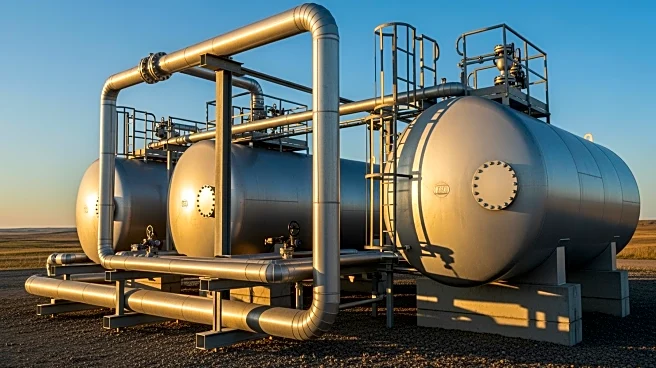What's Happening?
Vulcan Energy has signed a contract with Turboden and ROM Technik to construct a geothermal power plant at the Phase One Lionheart Project near Landau, Germany. The plant is expected to produce 275 gigawatt-hours of power and 24,000 tonnes of lithium hydroxide. The agreement, valued at €110 million, will be executed on a fixed turnkey basis, with payments made upon milestone completions. Vulcan Energy plans to use organic rankine cycle technology to generate renewable power from geothermal brine. This project is part of Vulcan's strategy to create an integrated sustainable lithium and renewable energy business, aiming to decarbonize battery production.
Why It's Important?
The construction of the geothermal power plant represents a significant step towards sustainable energy production and lithium extraction. By integrating renewable energy with lithium production, Vulcan Energy is addressing the growing demand for environmentally friendly battery materials. This initiative supports the European Union's goals for reducing carbon emissions and transitioning to renewable energy sources. The project also highlights the potential for geothermal energy as a viable alternative to traditional fossil fuels, contributing to the diversification of energy sources and enhancing energy security.
What's Next?
The successful completion of the power plant could pave the way for further investments in geothermal energy projects across Europe. Vulcan Energy's approach may serve as a model for other companies looking to integrate renewable energy with resource extraction. The project could also lead to increased collaboration between technology providers and energy companies, fostering innovation in sustainable energy solutions.
Beyond the Headlines
The partnership between Vulcan Energy, Turboden, and ROM Technik underscores the importance of international collaboration in advancing sustainable technologies. The project may influence regulatory frameworks and policies related to geothermal energy and lithium extraction, encouraging governments to support similar initiatives. Additionally, the focus on decarbonizing battery production aligns with global efforts to reduce the environmental impact of electric vehicles and other battery-dependent technologies.










